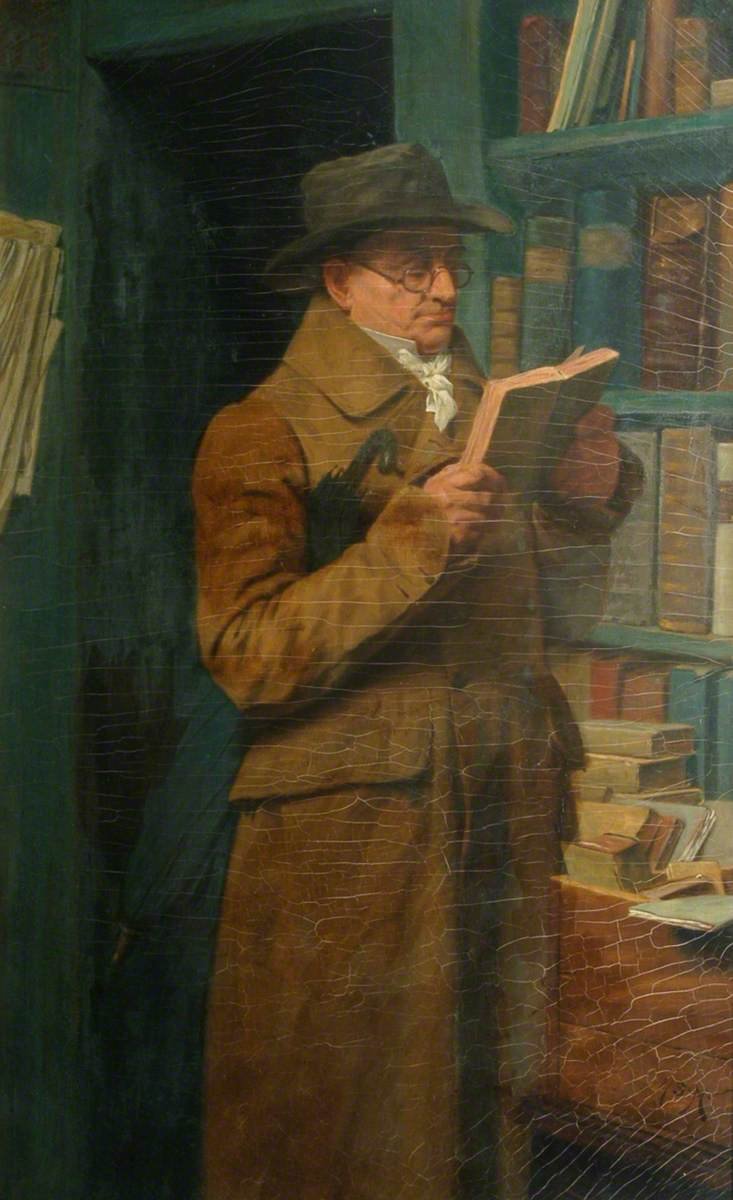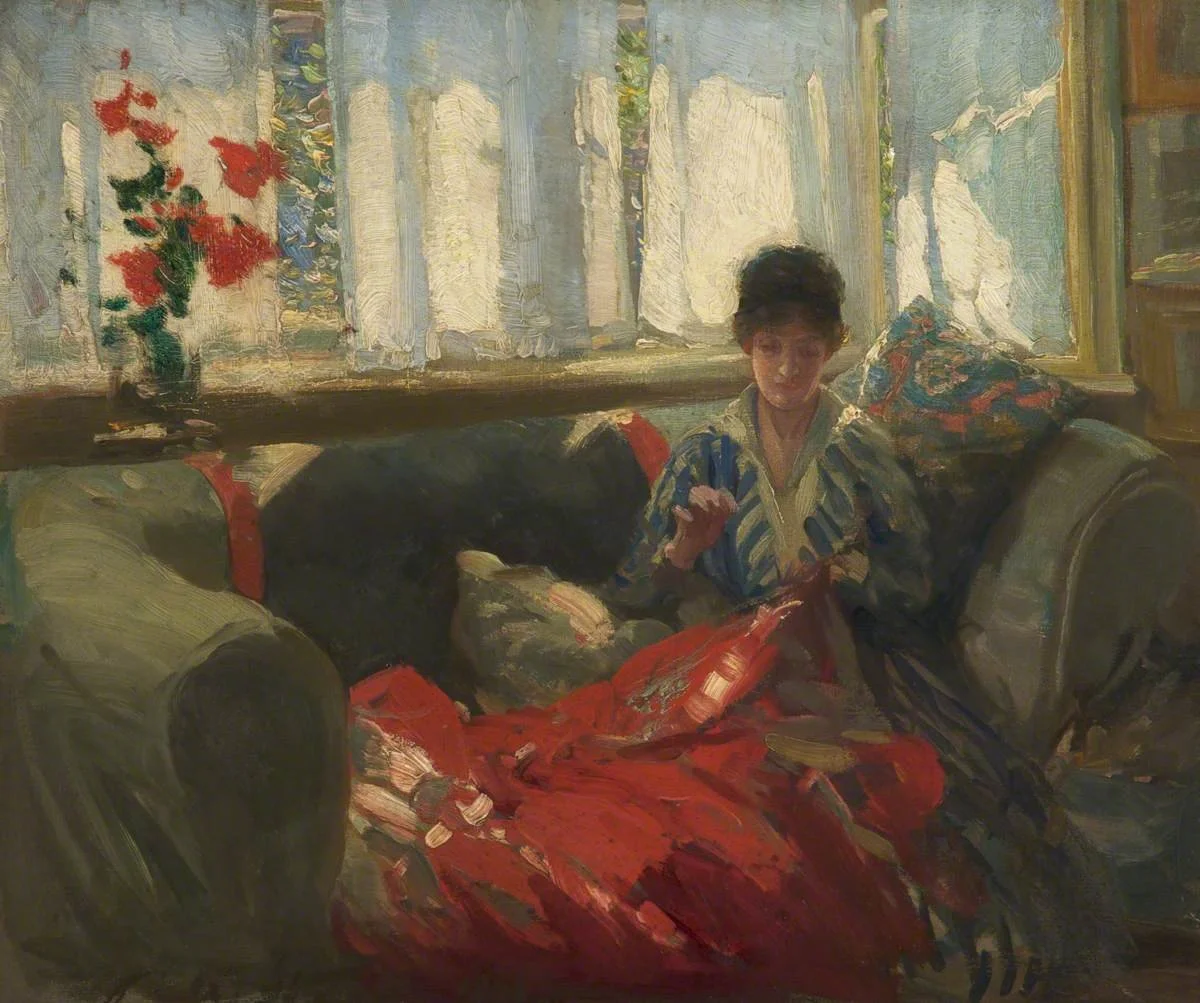Everything must come to an end, dear solver—the world, today’s crossword, even this sentence. . . .
Download this week’s crossword:
Solve this week’s crossword online:
Your Custom Text Here

James Jacques Tissot, The Parting
Everything must come to an end, dear solver—the world, today’s crossword, even this sentence. . . .
Download this week’s crossword:
Solve this week’s crossword online:

Alfred Elmore, On the Brink
Isabel Goldsmid wrote two brief books—this one in 1839, and a Christmas story, “Shadows and Sunshine,” in 1850. The latter begins “Christmas!—hallowed Church, blessed home festival!”—and so it would seem unlikely that its author is the Isabel Goldsmid (1788-1860) who married her first cousin, Sir Isaac Lyon Goldsmid, a leading banker and social reformer known among other things for advancing the cause of Judaism in Victorian England. But I haven’t found any traces of any other Isabel Goldsmid. The novel offers a first-person narrator (introduced by a censorious editor) who oddly combines romantic sentiment and detached amusement.
“The single volume before us has many claims to our indulgence. . . The tale is a boná fide love-story, feelingly told.” Literary Gazette, March 23, 1839
“The subject chosen by our authoress . . . is as old as the world itself . . . yet the handling and the general arrangement evince an original genius. There is a quiet humour and shrewd observation in many parts which speak of an acquaintance with varied society, and the power of turning opportunities to account. That important social qualification, good-humoured satire, appears to be her leading characteristic, yet there is much of real feeling touchingly expressed.” Morning Post, April 2, 1839
A (somewhat) contrasting view:
“The incidents . . . are hackneyed, but the authoress has wisely kept clear of all the clap-traps of superhuman generosity, and impossible reconciliations. She has painted life, not exactly as it is, but that portion of it to be found in the vale of tears and shadows.” Athenaeum, April 2, 1839
Download this week’s novel:
https://solo.bodleian.ox.ac.uk/permalink/f/89vilt/oxfaleph014598204

John William Godward, The Mirror
That’s right! I recycle! I separate cans, bottles, and paper. I break down the boxes and I tear the labels off the cans. I even tear the little plastic windows off the business envelopes and the pasta boxes. And, like other people who use yard signs, bumper stickers, banners, tee shirts, and other such means to announce their possession of basic virtues, I thought everybody would be glad to know this about me. You are glad, aren’t you? Of course. So here’s a crossword for you, in my honor.
Download this week’s crossword:
Solve this week’s crossword online:

Sir Francis Grant, Lady Susan Hamilton
A self-willed girl faces adversity.
Here is another novel by Paul (see Novels 025, 136, 198), featuring as usual carefully realized scenes of ordinary life.
“A pleasant, graceful book, written moreover in an earnest spirit.” Examiner, January 5, 1856
“A good and agreeable specimen of this kind of story; with sufficient variety of interesting occurences and well-drawn persons, a knowledge of society if not of life, and an unhackneyed moral.” Spectator, January 5, 1856
A (slightly) contrasting view:
“‘Dorothy’ is an excellent little story. There are no exciting incidents nor highly-wrought sentiments, but a great deal of excellent delineation of character. . . . A little more dash and vivacity and a greater variety of incident would be desirable in the author's future stories. ‘Dorothy’ is too still and uneventful to interest the general reader as much as the talent it displays merits.” Athenaeum, January 26, 1856
Download this week’s novel:
https://solo.bodleian.ox.ac.uk/permalink/f/89vilt/oxfaleph014184126

Lord Frederic Leighton, The Reconciliation of the Montagues and Capulets over the Bodies of Romeo and Juliet
Many people enjoy belonging to a group bound by a sense of grievance so that they can rage happily together, usually against some other similarly bound group that can rage in turn back at them. This is fun in itself; it can also lead to solid personal gain, as one’s route to success is eased by one’s fellow enragees, who form a sort of mutually-supportive grievance collective, or ring of ire. We here at David Alfred Bywaters’s Crossword Cavalcade and Weekly Victorian Novel Recommender belong to no such ring; we’re happy with everybody and everything in this fortunate world, including other people and their rage, to which we here pay a small tribute.
Download this week’s crossword:
Solve this week’s crossword online:

John Atkinson Grimshaw, London, St. James’ Street
Ulick Ralph Burke (1845-1895), barrister and historian of Spain and Mexico, wrote two novels, of which this was the first. His somewhat rambling plot gives him plenty of scope for satiric representation of English and Anglo-Indian society.
“The plot is interesting and well constructed, and there is a pleasant variety in the dramatis personae. . . . The style, too, is crisp and occasionally epigrammatic. . . . The characters . . . have . . . a distinct individuality.” Athenaeum, November 15, 1879
“We are indebted to Mr. Burke for a good novel, and a wholesome hero.” Spectator, December 6, 1879
A (somewhat) contrasting view:
“Beating the Air is not a strong book, but it is well meant, and, in its mild way, is far from being unpleasant.” Academy, November 22, 1879
Download this week’s novel:
v.1 https://archive.org/details/beatingair01burk/

Henry Stacy Marks, The Odd Volume
We here at David Alfred Bywaters’s Crossword Cavalcade and Weekly Victorian Novel Recommender work tirelessly to express ourselves as clearly and concisely as possible. As a result, we are always having to haul away great piles of excess verbiage; however, we are careful to dispose of it in an environmentally responsible manner. Much of it we donate to academic and philanthropic institutions, whose need for this commodity is insatiable. But this week we’re experimenting with the possibility of recycling.
Download this week’s crossword:
Solve this week’s crossword online:

George Vicat Cole, Near Borrowdale, Cumberland
Margaret Roberts (1833-1919) wrote nearly thirty novels between 1857 and 1897; this is one of the last. The heroine’s self-indulgent father is an especially well-done character.
Roberts “always gives us good work and always casts an unfailing charm over what she writes.” Manchester Guardian, May 10, 1892
“As a whole the sketch is worthy of the delicate hand” of the author. Academy, June 18, 1892
A contrasting view:
“Small beer.” Saturday Review, June 11, 1892
Download this week’s novel:

Thomas Sidney Cooper and Thomas Creswick, Farmyard Scene in Summer
Short-sighted solvers might be inclined to scoff at 60 Across in this week’s puzzle. But so did short-sighted critics scoff at Picasso’s cubes, at Rothko’s daubs, at Pollock’s drips—and who had the last laugh? When crosswords cease to make any sense at all, solvers will look back at 60 Across, and its relative nearness to sense, with a kind of bitter nostalgia, while future cultural historians will hail its ground-breaking, boundary-smashing departure from the dull routine of sense-making that had previously held puzzledom in its thrall. But go ahead and scoff—if you don’t mind the prospect of posterity’s scoffing at you.
Download this week’s crossword:
Solve this week’s crossword online:

A crossword of mine will appear August 24 in the Los Angeles Times.

John Ritchie, A Border Fair
Lieutenant-General Sir Edward Bruce Hamley (1824-1893), the younger brother of last week’s novelist, likewise supplemented a military career with literary efforts. This, his only novel (serialized in 1850, issued in book form in 1853-54), features, in addition to some sentimental ladies and gentleman officers, an amusingly bad alcoholic gambler.
“‘Lady Lee’s Widowhood’ is unquestionably one of the wittiest and pleasantest things that the press of our day has given to the public. . . . It furnishes the largest return of enjoyment for twenty-five cents that can be found in any bookstore in the country.” Southern Literary Messenger, December 1853
A (somewhat) contrasting view:
“This is a pleasant book. . . . The characters (with the exception of Colonel Bagot Lee) are not very complex specimens of human nature, but they are brightly coloured, and drawn with spirit. The character of Colonel Lee is of a higher class, and well worked out. . . . The story . . . drags somewhat at times, but it is withal a bright, healthy book, with a dash of hearty humour in it.” Athenaeum, February 18, 1854
Download this week’s novel:

Arthur Hughes, The Pained Heart
This is a sort of sequel to Puzzle 188, but even more likely to produce in the solver not only sighs, but rolls of the eyes, shrugs of the shoulders, and other activities that increase blood flow, oxygen absorption, and synaptic transmission. Studies have claimed to disprove the theory that regular crossword-solving can delay the onset of dementia, but those studies did not employ the crosswords available here at David Alfred Bywaters’s Crossword Cavalcade and Weekly Victorian Novel Recommender.
Download this week’s crossword:
Solve this week’s crossword online:

William Simpson, One of the Wards of the Hospital at Scutari, 1856
Major-General William George Hamley (1815-1893), having retired from the army in 1872, wrote three novels between 1878 and 1882, of which this is the second. Its conflicted, morally developing hero and the less glorious side of Victorian army life are both well represented.
The “real interest of the book” consists in “the style and thought, sometimes almost too elaborately allusive, in the well-drawn sketches of military life in the Crimea and elsewhere” and in “the very best exemplification of the undesirable type of elderly military man we have ever met with—at least in fiction.” Examiner, May 24, 1879
“What with fun, love, and adventure, there is no flagging in the book from first to last, and General Hamley is to be congratulated on having written an extremely entertaining novel.” Saturday Review, June 14, 1879
Download this week’s novel:

George Hayter, The Town Clerk of Brecon and His Family
Don’t let the title worry you—you can solve this puzzle, as you can all my puzzles, with the whole family gathered admiringly around you—unless, that is, you want to protect your progeny, during their impressionable years, from witnessing serious violations of linguistic norms.
Download this week’s crossword:
246-That’s-Just-Preverted!.puz
246-That's-Just-Preverted!.pdf
Solve this week’s crossword online:

A crossword of mine appears today in the Wall Street Journal.

Philip Wilson Steer, Woman Sewing
For Marsh-Caldwell, see Novels 069, 187. Despite the obvious didactic purpose of the contrast between the novel’s sisters, its characters are lifelike and its plot involving.
“We like the tale for its delicate shading of individual characters chosen from the most every-day life.” Literary World, August 3, 1850
The author “has depicted, with her usual vigorous and truthful colouring” the wretched lives of seamstresses. Critic, November 15, 1850
A (somewhat) contrasting view:
“‘Lettice Arnold’ is the work of a woman—a woman who has great facility of composition, and considerable imagination, but little judgment. It is literally ‘stuffed full’ of prejudices, especially against light literature as it is produced in France”; but it “is well written; and . . . it is one of the few novels which can be perused with pleasure and resumed without pain.” Observer, November 4, 1850
Download this week’s novel:

John Callcott Horsley, Critics on Costume, Fashions Change
After five weeks of unrelenting cruciverbal depression, it’s time for a change of pace; and that’s exactly what this week’s puzzle provides. Of course, you’ll nonetheless find in it all the usual qualities of puzzles on this site: norm-shattering formal innovation, the latest in culture, and a daring willingness to speak truth to power. (Also some wordplay.)
Download this week’s crossword:
Solve this week’s crossword online:

James Arthur O’Connor, View on the Shannon
Alexander James Beresford-Hope (1820-1887), a well-known politician and patron of architecture, took up novel writing late in life, producing this and its sequel (The Brandreths) a couple of years later. His spirited delineation of his hapless characters is entertaining, if a little ruthless.
“The author . . . loves to look on the lively side of things, and his novel may be described as a comedy of life and character. All his personages are more or less conspicuous by some eccentricity, foible, or amiable weakness; his incidents and complications are generally humorous, and the drollery is brought to a climax in the dénouement.” Saturday Review, October 16, 1880
“Thoroughly and in every sense a novel, conceived in a light and happy vein, and scarcely even demanding a serious thought from beginning to end.” Athenaeum, October 23, 1880
A contrasting view:
It is “lively enough as regards some passages” but “there is not a single character capable of creating a genuine interest in the mind of the reader. . . . It seemed somewhat coarse all through, and left a nasty taste in the mouth.” Academy, November 20, 1880
Download this week’s novel:
https://solo.bodleian.ox.ac.uk/permalink/f/89vilt/oxfaleph013992560 (Right-click (or control-click, if you have a Mac) on the “view digitized copy” links to download the novel’s three volumes in pdf form)

John William Godward, The Jewel Casket
We at David Alfred Bywaters’s Crossword Cavalcade and Weekly Victorian Novel Recommender aren’t satisfied with the gems of wordplay that can be purchased in the public marketplace. We prefer to dig our own out of the bowels of the earth, braving darkness and damp, noxious vapors and the ever-present threat of semantic collapse—all so that you, the solver, can adorn your mental domicile at our expense, little suspecting the cost. But we wouldn’t have it any other way.
Download this week’s crossword:
Solve this week’s crossword online:

Calvert Lithographing Co., Birds Eye View of the City of Detroit, c.1889
Edward Everett Hale (1822-1909), a Unitarian minister and prominent American social reformer, also wrote several novels. This one, though sometimes marred by its author’s enthusiasms, has some lively characters and several interesting settings.
A “quiet story of domestic life in America . . . , a life as homely and picturesque as any that Mrs. Gaskell or George Eliot has described.” Saturday Review, October 25, 1873
“A very characteristic story of American life . . . written with humour and pathos.” Spectator, November 29, 1873
Download this week’s novel:

Edward Robert Hughes, Dream Idyll (A Valkyrie)
I give you fair warning: the Downs in this puzzle (at least the themed ones) are all Across. Now that’s just the kind of startling, long-overdue innovation you’ve come to expect of my puzzles; but, like most wonderful things, it comes at some risk: if you’re subject to vertigo, you might want to solve the puzzle while lying on your side.
Download this week’s crossword:
Solve this week’s crossword online:

John Constable, The Vale of Dedham, Suffolk
John Cordy Jeaffreson (1831-1901) wrote, in addition to much nonfiction, fourteen novels between 1854 and 1890. An over-attention to historical and regional setting and a surplus of morality and sentiment are redeemed here by some well-defined characters and a good plot.
“The story is interesting throughout; the characters stand well on their feet, and are real human beings marked with individual character.” Athenaeum, March 28, 1863
It is “a good, sound novel. It may not be vividly interesting; but it is clever, truthful, and observant.” Literary Times, April 28, 1863
A (somewhat) contrasting view:
Though “told in a manner which . . . it would be easy to criticize, . . . still it succeeds . . . in exciting the interest . . . and some of the characters are drawn with no little delicacy and discrimination. Still the book is, in its general effect, a provoking one, for it might so easily have been made much better than it is. The simple process of leaving out altogether about two-thirds of the first volume would have wrought wonderful improvement in the novel. Not only is the first part of the story drawn out to an extent which is at once extremely wearisome and entirely useless, but Mr. Jeaffreson appears, in the earlier portion of the work, to have not unfrequently forgotten that he was telling a story at all.” Spectator, May 23, 1863
Download this week’s novel:
v.1 https://archive.org/details/liveitdownastor02jeafgoog